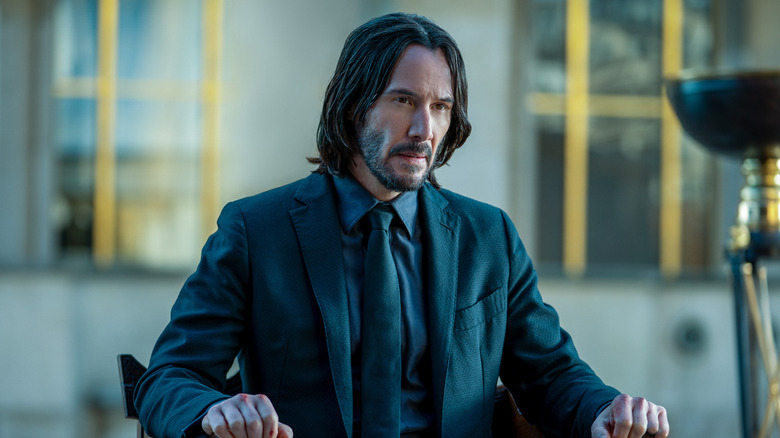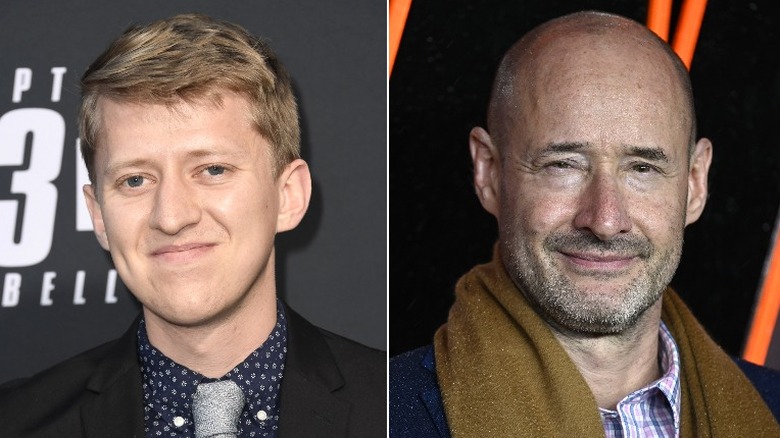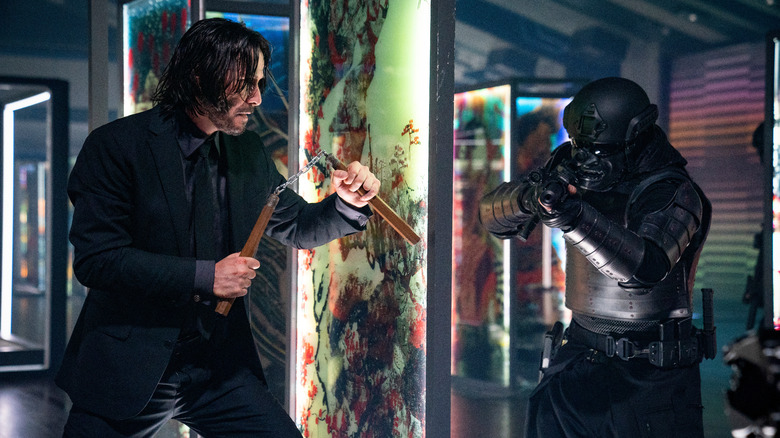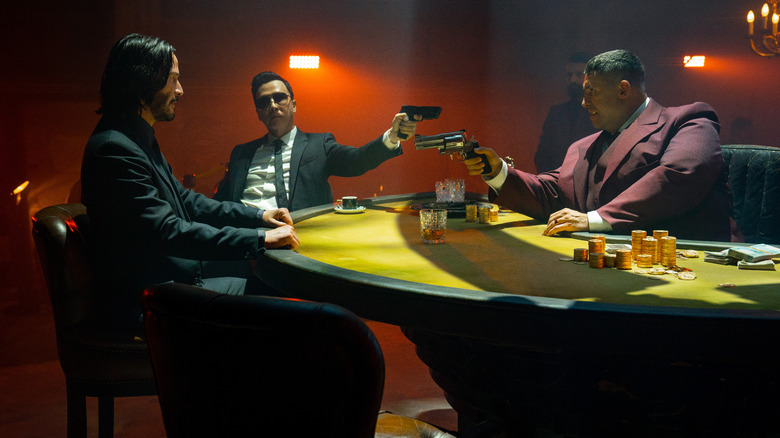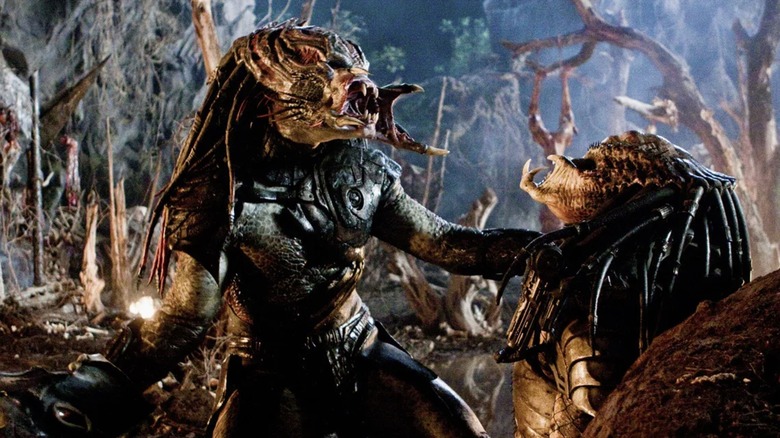John Wick: Chapter 4 Writers On Building The World, Writing Action, And More - Exclusive Interview
After three films penned by original "John Wick" creator Derek Kolstad, the writing reins on "John Wick: Chapter 4" were turned over to Shay Hatten and Michael Finch. Hatten is not new to the franchise, having contributed to "John Wick: Chapter 3 – Parabellum," while his other credits include Zack Snyder's "Army of the Dead" and Snyder's upcoming space saga "Rebel Moon." Finch wrote the Dylan O'Brien thriller "American Assassin" as well as 2010's "Predators," an underrated high mark for that series.
As with the previous "John Wick" movies — all directed by Chad Stahelski and starring Keanu Reeves in the title role — "Chapter 4" continues John's quest to finally retire from a life of killing and free himself from the shadowy criminal organization the High Table. To do so, he must bring the fight to the High Table's most malevolent emissary yet, the Marquis (Bill Skarsgård), and face two new assassins: an old friend named Caine (Donnie Yen) and a freelancer called the Tracker (Shamier Anderson).
John's dwindling band of allies includes stalwarts Winston (Ian McShane), Charon (Lance Reddick), and the Bowery King (Laurence Fishburne), while he also seeks help from another old associate, Osaka Continental manager Shimazu (Hiroyuki Sanada), and his distrustful daughter Akira (Rina Samayama). Along the way, John once again battles legions of killers all out to eliminate him, as "Chapter 4" takes the stylized action and locales of the previous films to new heights.
In Looper's exclusive interview, Hatten and Finch delved into the "John Wick" writing process and how they conceived sequences for a director who's among the very best when it comes to staging jaw-dropping action scenes. "This guy understands what makes action feel visceral and pop on screen," said Hatten. "It really enhances anything that we can put down on paper."
How to write a John Wick movie
Can you walk us through the process of putting the story together? How does it go from ideas that Chad and Keanu have to what you guys are putting down on the page?
Shay Hatten: Well, it's always a collaborative process. The main thing we can say is that it is a process of Chad [having] very strong ideas. He comes to this movie with Keanu, who has his extremely strong opinion of this character and the journey he's on. Then, as a writer, you're trying to service the story as it's been unfolding over the previous three movies. The reason that this particular story was so fun to start to figure out is because the third one ended in such a cliffhanger, and it necessitated us asking ourselves, what would happen to this character after the end of that movie when we have to have a bit of a time jump so he's healed, but also he's still in so much danger from this world?
Where would he be? Where would he be seeking shelter now? Who would be coming after him? We're naturally trying to follow the story where it leads us while also trying to service whatever great action ideas Chad has and Keanu's spiritual ideas about the character ... You start with the big bundle of things you loosely want to explore, and then you dive in and figure it out.
Michael Finch: It's a really interesting process. It works backwards in a lot of ways. A lot of this begins with Chad being inspired by other films, other genres of film, be it "Once Upon a Time in the West," "The Good, the Bad and the Ugly," or be it "Bullitt" or "Dirty Harry" or a "Zatoichi" film. We start with those large ideas, and then Chad starts to come up with this stuff — "Look, I want to do something with waterfalls. I want to end it with a duel. I want to begin it in the desert." Once you start getting those pieces together, we start stringing them together. By virtue of the fact that "John Wick" is very episodic, it allows you to tell these discreet little moments.
It could — in other instances or in the hands of a lesser filmmaker — feel quite jarring to jump from one moment to another in one place to another. Somehow, Chad has the capacity with [cinematographer Dan] Laustsen and Keanu's ability to sell this sense that we're moving seamlessly through time. That allows you to service these ideas of venue and action and of character, which is where we come in and try and create as much depth within these moments as possible, because there's many ways you could render these action scenes. The nice thing about "John Wick" — one thing I appreciate — is that ... the characters, despite being quite heightened in a pushed and heightened world, have a certain pathos to them. They have a certain emotional resonance.
Now, part of that, granted, is the fact that [Laurence] Fishburne can sell pretty much anything. So can Ian [McShane]. [Bill] Skarsgård's fantastic. Hiro [Sanada]'s great. Donnie [Yen]'s amazing. Rina [Sawayama], who as far as I know has never acted before, was incredibly powerful. They all bought into their characters; they all bought into the idea of the movie. Once that happened, you start tying these characters together in fun, interesting ways. It's a really interesting, backwards process.
Putting action on the page
What do the action scenes actually look like on the page? I imagine that there's a certain amount you guys can put down, and then a lot of it happens as Chad and the stunt people start to choreograph it.
Finch: They're quite detailed as written out, and they're done in conjunction with Chad. On the set, essentially, we walk through and rework them entirely to match the physical dimensions of the set and the budget and where people are going to come in and out of. Everybody prepares for that for weeks — the stunt guys run, run, run, and then the day of, Chad shows up and he changes it all up and he throws a wrench into it.
At first, I was like, "What the f*** are you doing, dude? This is insane." But there's a method to this madness. What he understands, having been a professional fighter, is that fights are not choreographed. Fights are interesting because they're sloppy, and people slip and they slide and they miss hits, and things don't happen the way that you want them to happen. By throwing a wrench into the choreography and changing things around a little bit, he makes the stuntmen have to be reactive. He makes Keanu have to think on his feet, and that gives it this crazy, intense, real look, even within the background of this heightened environment. It's very much a give-and-take. You write it, you know what it's going to be, and you also know he's going to change it up at the last moment.
Hatten: As writers, having Chad directing our action sequences is a gift because — Mike [and I] can both attest to it — you can write what you think as a writer is the coolest action scene on the page, but if it's not rendered by somebody who knows what they're doing and understands and respects action as a filmmaking art form, it doesn't work. That's one of the main things I learned from working with Chad. When I first started working with him, I looked back at the movies he'd been the stunt coordinator for and realized he had stunt-coordinated many of my favorite action sequences throughout the recent history of movies. This guy understands what makes action feel visceral and pop on screen, and it really enhances anything that we can put down on paper.
Writing John Wick movies without a net
Michael, you're new to the franchise, but Shay, you worked on "John Wick 3." What was that dynamic like? Michael, did you come in almost like a fresh pair of eyes?
Finch: A little bit, yes. At a certain point, I came in just to give a second opinion and to answer some of the questions that were coming up as they got closer and closer to production. It had to do with location, it had to do with time shifting some of the material, and I had worked with Chad somewhat on other earlier second unit stuff. I knew him, and it was effectively that — building off the template that Shay had built.
Shay, were you like, "Who the hell's this new guy and who does he think he is?"
Hatten: [Laughs] No, as a writer ... these movies are an intensive process to write, and you spend so much time working on them that at a certain point, you're like, "I've looked at this every way. I'm tearing my hair out." Having Mike come in and lend his expertise was a gift to the movie, truly.
Is there something like a detailed show bible for the "John Wick" world? Or do you make it up as you go along?
Finch: It's the latter.
Hatten: Yeah, which as a writer is what's so thrilling about getting to work on these movies. You don't have 10,000-page "Game of Thrones" novels where you're like, "Okay, I know what all these character's arcs are, where it's going, what the ending is." No, you're always reacting to what happened in the past movie and what seems cool. There's not a bible of what this content all looks like. It's only what's been on screen previously in the movies.
That's what's so thrilling, because everybody involved in them can be bringing new ideas to the fore. There's nothing that I or Mike can throw out that Chad will say, "No, no, that definitely can't work because it conflicts with the preexisting IP." It's always open to discussion of what serves the story best [and] where the story naturally wants to go. That's thrilling, as it means that we have to be a natural part of the world-building. It's an unparalleled experience.
Finch: This franchise is largely successful because it treats its audience with respect. It treats them like adults. It does not stop to give you exposition or back story. It simply drops you into the moment, and you either get on the train or you're left behind. There's something very enlivening about that. It makes me think a little bit.
Chad and Keanu are both very big on this, that they don't want to answer the questions. They don't want to tell you what this world looks like. They want you to think about it, because your imagination is more potent, richer, larger than our capacity to render that on paper or on film. If you can walk out of there thinking, "Wow, where does this go?" That's a win for us. That's what we want.
Ballerina, Rebel Moon, and more
Shay, you've been working on the "John Wick" spin-off movie "Ballerina" starring Ana de Armas. How does that expand on the "John Wick" world? What direction does it take?
Hatten: "Ballerina" is a really interesting one ... What I can say is that the main character is somebody who came up through the same ballet academy that we see in the third film with Anjelica Huston, which, as you know, is a place that John also has a history with. In a cool way, by showing this new character coming out of that world, you might get some answers about what John's own history was like in that place and some of his training. We get to answer some questions about John, while also introducing a new character who then — I won't spoil this — goes to a completely different corner of the "John Wick" world that we have not seen before at all.
That opens up a whole new avenue. It's [an] exciting extension, but we'll still bring back the people that you can't make a "John Wick" movie without, like Ian McShane — can't have a "John Wick" movie without him. We'll still have those key tenets that everyone loves.
Shay, I want to ask you about working with Zack on "Rebel Moon." I read that the seed for this was a "Star Wars" pitch that Zack had made that ended up not going anywhere. Is that the case, and how do you do a space opera when "Star Wars" has had such a huge footprint on that genre?
Hatten: I do think that's the case, but that was years before my time. By the time I came to it, it was like Zack had redeveloped it in so many different fascinating directions that I was coming into it and going, "Whoa" — mind-blown by all the world-building he'd done. The way that you do a space opera that feels different from "Star Wars" is it's filtered through the imagination of Zack Snyder. Naturally, by extent of that, it's going to have a completely different tone and flavor that is going to be exciting to people. Zack is one of the best world-builders we have, so I'll work for him as long as I possibly can.
What's happening with the "Army of the Dead" franchise? Is "Planet of the Dead" the next one, and where does that stand?
Hatten: That's always been our idea for the next one, but I don't think I'm at liberty to say anything more about the future of that universe. I don't know what I could say without Zack getting mad at me.
Respect for Michael Finch's Predator sequel
Michael, you wrote the underrated "Predators" more than a decade ago. Do you feel like that film has gotten its due in the intervening years? How do you feel about the direction they've taken that franchise lately with "Prey"?
Hatten: I love that movie, for the record.
Finch: Oh, thank you. It got slightly beat up when it came out. Could have been when it came out, but it got unduly kicked around. In the last few years, it's been recognized as the second-best of that line. You try not to let your ego get into this, because if you look at the reviews too much, it can be pretty damaging — but it is nice that people started to recognize ["Predators"] as a pretty decent movie.
It was fun as hell to do. [Producer Robert] Rodriguez is absolutely amazing to work with, and Nimrod [Antal, director] was great, and we had some really good actors, actually. We had a cast that won Academy Awards subsequently and had nominations before that. It was a cool experience, and I'm happy we were able to continue the canon.
[I'm] looking forward to seeing where they go from here. What they're doing right now is absolutely fantastic. The idea of now time-shifting this opens up so many opportunities. Medieval times, samurai times — you name it, you can do anything. You can go to the future; you can go to the past. I'm thrilled with the direction [in] which they're going.
And here you are 13 years later working with Laurence Fishburne again.
Finch: I would pay to watch that guy read the phone book, okay? That is the thrill of my existence, honestly.
"John Wick: Chapter 4" is out in theaters now.
This interview has been edited for clarity.
